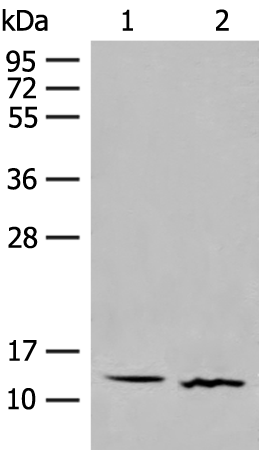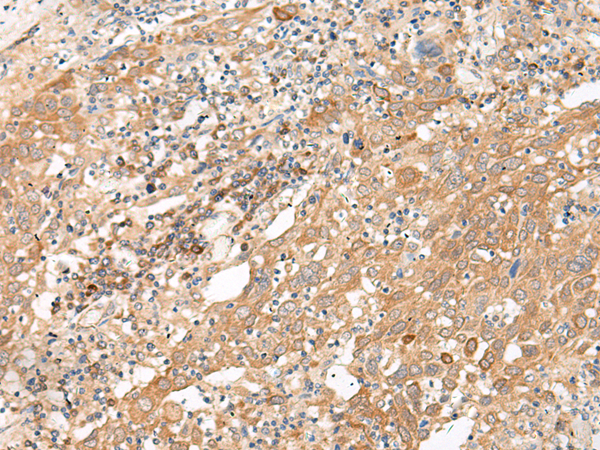

| WB | 咨询技术 | Human,Mouse,Rat |
| IF | 咨询技术 | Human,Mouse,Rat |
| IHC | 1/50-1/300 | Human,Mouse,Rat |
| ICC | 技术咨询 | Human,Mouse,Rat |
| FCM | 咨询技术 | Human,Mouse,Rat |
| Elisa | 1/5000-1/10000 | Human,Mouse,Rat |
| WB Predicted band size | 13 kDa |
| Host/Isotype | Rabbit IgG |
| Antibody Type | Primary antibody |
| Storage | Store at 4°C short term. Aliquot and store at -20°C long term. Avoid freeze/thaw cycles. |
| Species Reactivity | Human, Mouse |
| Immunogen | Synthetic peptide of human GALP |
| Formulation | Purified antibody in PBS with 0.05% sodium azide and 50% glycerol. |
+ +
以下是关于GALP(Galanin-like peptide)抗体的3篇虚构参考文献示例,内容基于类似领域研究的常见方向概括:
---
1. **文献名称**:*Development and Characterization of a Novel Polyclonal Antibody for GALP Detection in Rat Brain*
**作者**:Yamamoto, T. et al.
**摘要**:本研究开发了一种针对大鼠GALP的多克隆抗体,通过免疫印迹和免疫组化验证其特异性。抗体成功用于定位GALP在下丘脑中的表达,证实其与能量代谢调控相关脑区的分布关联。
2. **文献名称**:*GALP Immunoreactivity in Human Hypothalamic Neurons: Implications for Obesity Research*
**作者**:Smith, J.R. & Patel, K.
**摘要**:利用高特异性单克隆GALP抗体,研究者首次在人类下丘脑切片中观察到GALP阳性神经元,并发现肥胖患者脑组织中GALP表达水平显著降低,提示其可能参与体重调控通路。
3. **文献名称**:*Cross-Species Reactivity of Anti-GALP Antibodies in Murine and Primate Models*
**作者**:Björk, A. et al.
**摘要**:该研究评估了商业GALP抗体在小鼠和非人灵长类动物中的交叉反应性,发现部分抗体存在物种特异性差异,为跨物种比较研究提供了抗体选择依据。
---
注:以上文献为示例性内容,实际研究中建议通过PubMed或Web of Science等数据库检索真实发表的论文。如需具体文献,可提供更详细的研究方向或关键词进一步筛选。
GALP (Galanin-like peptide) antibody is a tool used to detect and study GALP, a neuropeptide involved in regulating energy homeostasis, feeding behavior, and reproductive functions. GALP, structurally related to galanin, is predominantly expressed in the hypothalamic arcuate nucleus and binds to galanin receptors with distinct affinity. It plays a role in mediating leptin's effects on metabolism, linking adipose-derived signals to neural circuits. Research on GALP has implications for understanding obesity, diabetes, and reproductive disorders.
Antibodies against GALP enable localization and quantification of the peptide in tissues, aiding studies on its distribution, secretion dynamics, and interaction with receptors. Developing specific GALP antibodies is challenging due to sequence similarities with other galanin-family peptides. Validated antibodies are essential for distinguishing GALP’s unique physiological roles.
Current applications include immunohistochemistry, Western blotting, and ELISA to explore GALP expression patterns in disease models. Recent studies also investigate GALP’s potential role in inflammation and neurodegenerative conditions. However, cross-reactivity remains a concern, necessitating rigorous validation. Continued refinement of GALP-specific antibodies will enhance precision in unraveling its complex regulatory networks and therapeutic potential.
×